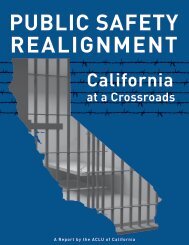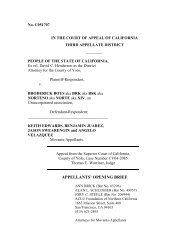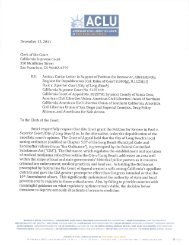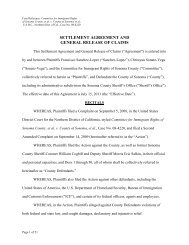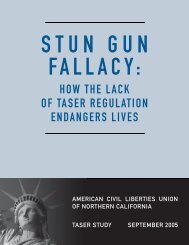Download - ACLU of Northern California
Download - ACLU of Northern California
Download - ACLU of Northern California
You also want an ePaper? Increase the reach of your titles
YUMPU automatically turns print PDFs into web optimized ePapers that Google loves.
Immigrants' Rights<br />
“Secure Communities” Means Anything But<br />
Immigrants’ rights advocates saw trouble coming in 2008 with the introduction<br />
<strong>of</strong> the “Secure Communities” program, also known as S-Comm, which<br />
uses the criminal justice system to channel immigrants into the deportation<br />
system, regardless <strong>of</strong> whether they’ve been convicted <strong>of</strong> a crime. It works by<br />
checking the fingerprints <strong>of</strong> anyone arrested by the local police against Department<br />
<strong>of</strong> Homeland Security databases—even people arrested for minor<br />
infractions, and even if they turn out to be innocent. Contrary to claims that<br />
the program would help catch hardened criminals, seven in ten <strong>California</strong>ns<br />
deported under S-Comm had committed no crime or were picked up for minor<br />
<strong>of</strong>fenses like traffic violations. Some were domestic violence victims who<br />
had contacted the police for help.<br />
In communities across the region, <strong>ACLU</strong> activists worked in coalitions to stop<br />
local law enforcement agencies from participating in the program. As a result<br />
<strong>of</strong> advocacy by one <strong>of</strong> these coalitions, Santa Clara County adopted the most<br />
progressive policy in the nation. The policy makes it clear that it’s not the job <strong>of</strong><br />
Santa Clara County to be doing immigration enforcement. In Sacramento, the<br />
<strong>ACLU</strong>-NC has been a key coalition partner in efforts to pass the TRUST Act, which<br />
would limit local enforcement <strong>of</strong> immigration detainers, or “holds”, to those issued<br />
for persons convicted or a serious or violent <strong>of</strong>fense. As sponsor Assemblymember<br />
Tom Ammiano and others have pointed out, most law enforcement<br />
<strong>of</strong>ficers don’t want to double as federal immigration agents. They know that it<br />
discourages witnesses and victims <strong>of</strong> crime from coming forward and ultimately<br />
harms public safety for everyone.<br />
Breaking the Chains<br />
Government statistics reveal that nearly 95% <strong>of</strong> immigration detainees have<br />
no violent criminal convictions and most are considered low-risk. Yet 100% <strong>of</strong><br />
them are shackled at the wrists, waist, and ankles when they appear in San<br />
Francisco immigration court, including the elderly and people with mental disabilities.<br />
The <strong>ACLU</strong>-NC filed a class-action lawsuit in August 2011 to stop this<br />
barbaric practice, and in December a court rejected the government’s efforts<br />
to dismiss the case. We hope to see the last <strong>of</strong> shackling by the end <strong>of</strong> 2012.<br />
<strong>ACLU</strong>: 1, ICE: 0 (But Who’s Keeping Score?)<br />
In July we announced a settlement with the Sonoma County Sheriff and<br />
County <strong>of</strong> Sonoma that will limit unlawful collaboration between the County<br />
and federal immigration <strong>of</strong>ficials. Under the agreement, the Sherriff’s <strong>of</strong>fice<br />
will no longer participate in joint field operations with U.S. Immigration and<br />
Customs Enforcement (ICE) unless the agency refrains from arresting or taking<br />
custody <strong>of</strong> people solely based on a suspicion that they are unlawfully present<br />
in the country. Local peace <strong>of</strong>ficers and ICE continue to have the ability to<br />
detain or arrest individuals who are suspected <strong>of</strong> criminal activity or who are<br />
thought to pose an imminent threat to public safety.<br />
11






